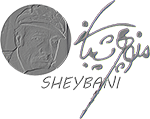

Libretti for Opera
and Persian Version
of The Sound and Light show of Persepolis.
Sheybani Believed that breaking the prosody increases the poem's rhythm but limits the ability to create a musical theme such as opera
libretti or work with symphonic music. Therefore, he tried to alter these concepts.
He considered the word, not the stanza, to serve as the unit of the poetry. He believed the word possesses three weight units: 1- Image weight,
2- Musical weight, and 3- Setting weight. This switch in weight units wired the range of emotions to his characters on the stage. He adhered to
these guidelines not only for his poems but also for writing all his opera libretti.
In 1965, Sheybani was commissioned to write the first Persian libretto for the opera "The Peasant Festival" (Jashne-Dehgan, which was
performed during the inauguration of the first Iranian opera house, "Talar Roudaki" named “Talar Vahdat” after the revolution. Music was
composed by Ahmad Pejman and performed by the Tehran Symphony Orchestra conducted by Heshmat Sanjari, the National Choir
conducted by Ms. Bagcheban, and opera director Enayat Rezaee.
While working for the Roudaki Opera House, he wrote several libretti, including the "Delavar-Sahand" opera inspired by The mythical Persian
Hero ”Babak Khorramdin” from the land of Sahand, in 1968. Sadi Hassani conducted this opera and the music was provided by Ahmad Pejman.
He also wrote the text for the musical play “Samandar” (Music by Ahmad Pejman) and the Libretto for the Opera of "Atoussa" Composer and
Conductor: Thomas Christian David Performed at Roudaki Hall, Tehran 1967, available
at: Atossa .
Atossa opera by Thomas Christian David with Persian libretto
Additionally, he wrote ballet narratives for The White Devil, Salomeh, and Chehel Sotoon.
Sheibani authored the Persian version of the "Sound and Light" narrative, staged at the Persepolis ruins in 1971. He used for this work his
experience as a librettist and his knowledge of theatrical Art combined with his distinctive poetry style.

